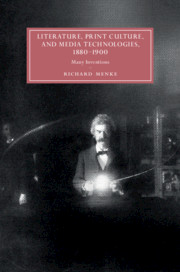Book contents
- Literature, Print Culture, and Media Technologies, 1880–1900
- Cambridge Studies in Nineteenth-Century Literature and Culture
- Literature, Print Culture, and Media Technologies, 1880–1900
- Copyright page
- Contents
- Figures
- Acknowledgments
- Introduction
- Chapter 1 A Message on All Channels
- Chapter 2 Fictions of the Victorian Telephone
- Chapter 3 New Media, New Journalism, New Grub Street
- Chapter 4 The Sinking of the Triple-Decker
- Chapter 5 Writers of Books
- Chapter 6 Words Fail
- Chapter 7 A Connecticut Yankee’s Media Wars
- After Words
- Bibliography
- Notes
- Index
- Cambridge Studies in Nineteenth-Century Literature and Culture
Introduction
Inventing Media and Their Meanings
Published online by Cambridge University Press: 30 September 2019
- Literature, Print Culture, and Media Technologies, 1880–1900
- Cambridge Studies in Nineteenth-Century Literature and Culture
- Literature, Print Culture, and Media Technologies, 1880–1900
- Copyright page
- Contents
- Figures
- Acknowledgments
- Introduction
- Chapter 1 A Message on All Channels
- Chapter 2 Fictions of the Victorian Telephone
- Chapter 3 New Media, New Journalism, New Grub Street
- Chapter 4 The Sinking of the Triple-Decker
- Chapter 5 Writers of Books
- Chapter 6 Words Fail
- Chapter 7 A Connecticut Yankee’s Media Wars
- After Words
- Bibliography
- Notes
- Index
- Cambridge Studies in Nineteenth-Century Literature and Culture
Summary
In 2008, the First Sounds project digitally scanned and converted the paper tracings of Édouard-Léon Scott de Martinville’s phonautograph, recreating sounds that hadn’t been heard since the middle of the nineteenth century. Never intended to be played back, Scott’s phonautograms belong to a world in which writing was the universal standard for other media and literature was often the test case for new media technologies. But even by the time of Thomas Edison’s tinfoil phonograph in the late 1870s, that orientation was changing. This book analyzes the relationships of print literature to other media in the late nineteenth century, a time when an astonishing array of new media technologies were imagined, invented, and adopted. It argues that writers became vernacular media theorists as they traced systematic relationships between different forms of print and nonprint media, and it brings the history of books and printed writing into closer contact with the interdisciplinary field of media archaeology.
Keywords
- Type
- Chapter
- Information
- Literature, Print Culture, and Media Technologies, 1880–1900Many Inventions, pp. 1 - 24Publisher: Cambridge University PressPrint publication year: 2019



